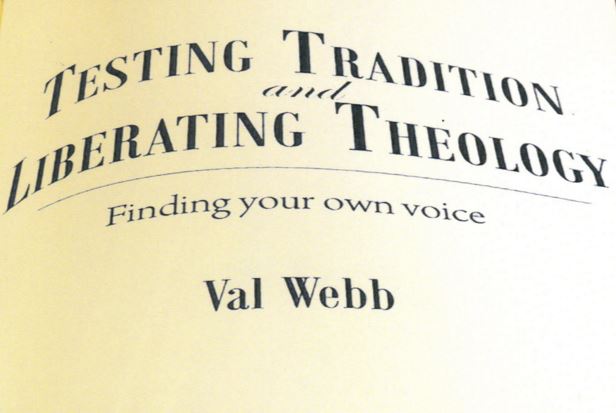Book Review by Duane M. Gebhard: “Testing Traditions and Liberating Theology”

Val Webb, a lay theologian par excellence, set out to address a void in the realm of conversations about faith, praxis, and the written word. In her most recent book she not only enters the space that is so often left untouched with careful explanation and teaching, she also assists the reader to gain new understandings and find a voice in the dialogue of faith and life. Entering the book, one hears the invitation to put on earphones and be guided through the development of Christian theology from the time of the disciples through to followers of Christ in this day, as though one were being led through a museum of the development of artistic expression.
Beginning with the questions “How do we know what we know?” and “What is theology?, the author draws upon her own journey of exploring matters of faith and learning about God as well as a wealth of resources in religious writing and thought. She masterfully delves into the elusiveness of theology while addressing the feelings of those experiencing the holocaust and those who claim that “God is dead,” as she explores the fathomless depth of doubt in the face of God’s self-revelation over the years. In Defence of Doubt: an invitation to adventure is the title of an earlier book from which she draws insights and finally concludes “we need to see doubt for what it is – a positive nudging that pushes us out of inadequate theology into self-determination and an independence of mind that nominates ourselves as our authority to choose in matters of faith and belief” (p. 140) From this point, Webb moves into the exploration of contextual theology, liberation theologies, and the emergence of feminist theologies.
All of this exploration gives rise to the strongest theme of this entire volume: the clear argument for a new day as laity claim the right to “do theology” and are encouraged not only by clergy but by all theologians, as in the voice of Karl Barth, who “in his day called all Christians, as part of their baptism, to be theologians, learners and teachers, sharing prophetic and apostolic function.” (p. 201). Webb carefully sheds light on developments over the past thirty years that have encouraged broader exploration of theological matters among laity and clergy, while at the same time have drawn criticism from those who consider themselves to be at the center of the Christian faith. After reviewing such themes as contextual, liberation, feminist, and progressive theologies, the author suggests that it is time for laity, clergy, and teachers to break down the barriers and “do theology” together wherever we happen to gather, and with whatever medium of communication we use.
Finally, in a beautifully written chapter on “theological hospitality” Webb concludes “Theological hospitality begins with each person able to talk about what is in their hearts without being told they are wrong or unacceptable.” (p. 242). As a reader, I felt new freedom and an invitation to be in public dialogue about matters of faith and beliefs about God and the scriptures. I felt encouraged to move beyond the narrow constraints of “doing theology” only with those I could trust and define in my own terms, to the broader world of religious faith in many traditions as we learn together about each other, about how we know God, and about how we understand and care for the world. I hope this book receives a broad reading and study.
About the Reviewer:
Duane is a retired UM clergy in the Minnesota Conference, teacher in faith formation on the seminary level, and author of Growing Points Star: a Tool for Disciple Formation.


